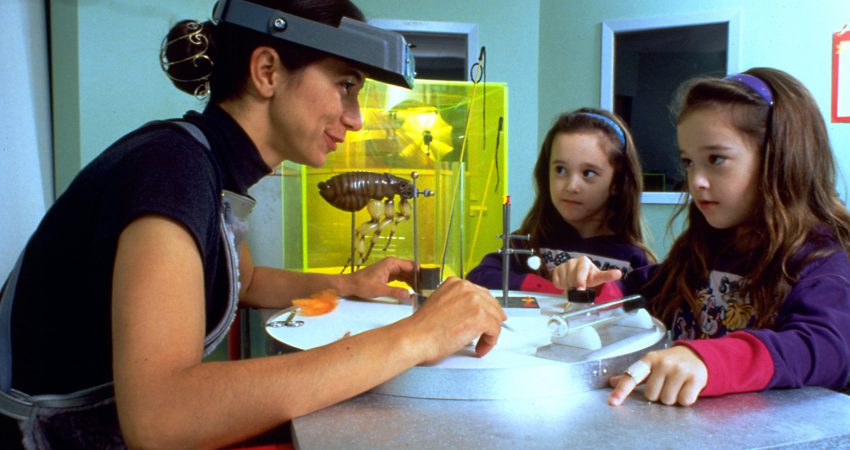
By Heather King - September 2014
PAPER CITATION
Hundal, S., Levin, D. M., & Keselman, A. (2014). Lessons of research-teacher co-design of an environmental health afterschool club curriculum. International Journal of Science Education, 36(9), 1510–1530. doi:10.1080/09500693.2013.844377
This paper describes the process of designing an afterschool curriculum aimed at supporting argumentation skills in the context of environmental health. As a rationale for the study, the authors note that few studies have looked at afterschool activities in terms of improving students’ reasoning skills. However, a direct assessment of student learning was not conducted. The data came from teacher interviews prior to the co-design process and midway through implementation of the curriculum. The analysis focused on teachers’ views on environmental health and on argumentation.
The researchers found that the teachers considered argumentation to be relevant to science learning and useful for engaging students. Teachers also considered environmental health to be a significant content area for middle school students: It links to existing curricula, is relevant to students’ lives, can inspire students, and is essential for informed citizenship. The paper gives more space, however, to the authors’ reflections on the co-design process.
Co-design has been defined as “a highly facilitated, team-based process in which teachers, researchers and developers work together in defined roles to design an educational innovation, realize the design in one or more prototypes and evaluate each prototype’s significance for addressing a concrete educational need” (Penuel, Roschelle, & Shectman, 2007, p. 5).
Co-design efforts can support the development of a community of practice, help teachers develop professionally, and give them a sense of urgency and ownership in the design of a curriculum. However, previous studies have noted that participants in a co-design project may have different ways of identifying and evaluating goals and successes. Indeed, the paper cites some studies in which teachers said that researchers were too theoretical and not practical enough and others in which researchers viewed teachers’ lack of content knowledge as a barrier to effective design.
In this instance of co-design, the researchers felt that the final product — the afterschool club curriculum — included numerous opportunities for students to develop and express their knowledge of environmental health issues. However, it did not support students in reflecting on and revising their own and opposing positions, a necessary skill in argumentation. In the interviews, teachers appeared more keen to deal with conceptual understanding and to address misconceptions than to develop argumentation skills such as using evidence to construct claims and rebuttals.
In addition, when the researchers suggested occasions for encouraging argumentation, the teachers highlighted practical constraints, content guidelines, and time pressures. A further mismatch is clear from the researchers’ description of their desire to help students clarify the distinction between theory and evidence, whilst the teachers cited the importance of improving students’ information research skills.
In short, although the teachers acknowledged that argumentation is an important vehicle for learning, they had additional goals for the afterschool programme. They wanted to retain student interest, ensure that content was delivered, and keep the activities within the allotted time. They wanted to make the club fun whilst moving at a fast pace across many topics.
The contrast between the teachers and the researchers is evident in the following teacher quote:
I am thinking about how important it’s going to be to get the kids hands-on because they won’t [otherwise] come back for a week or two, and so that really limits our opportunity for argumentation.
In short, the teachers appeared to believe that, in the limited time available, argumentation activities were less important than hands-on activities; moreover, the latter would be more effective in retaining student interest. As a result, argumentation was relegated to the background, and the initial aims of the course were not fully met.
Implications for Practice
Co-design is heavily influenced by the context of the participants’ practical experiences and the dynamics of the group. In this instance, the authors acknowledge that they should not have expected their teacher co-designers to fully share their commitment to argumentation and to see content as secondary. Rather, the researchers and teachers should have explored environmental health topics at the beginning of the process and then jointly identified particular controversies that were likely to pique student interest, spark student debate, and foster argumentation.
In other words, co-design projects are likely to be more effective if researchers and teachers jointly identify aims and goals and if they attend to the concerns — both practical and theoretical — of all participants.
However, it is important to note that the products of co-design can be extremely effective even if they are not entirely what research participants expected. The curriculum described in this article has proven to be an award-winning contribution to the field of environmental health education and has drawn attention to the potential for afterschool programmes to support students’ scientific literacy.
References
Penuel, W. R., Roschelle, J., & Shectman, N. (2007). Designing formative assessment software with teachers: An analysis of the co-designing process. Research and Practices in Technology Enhanced Learning, 2(1), 51–74.




